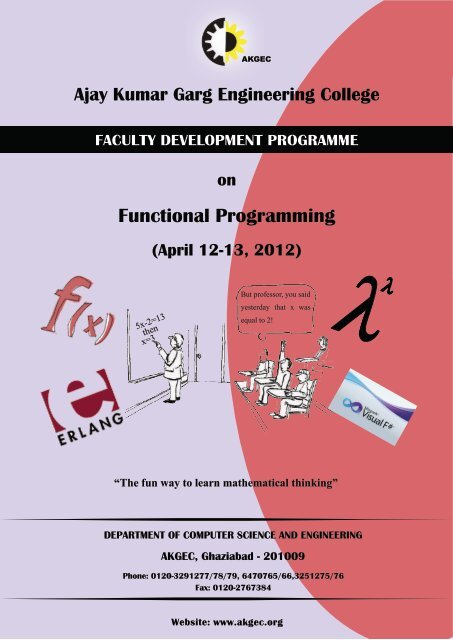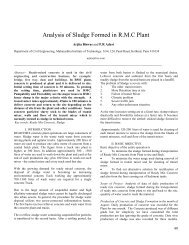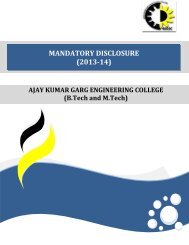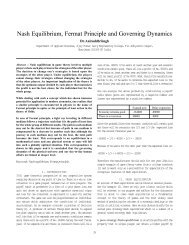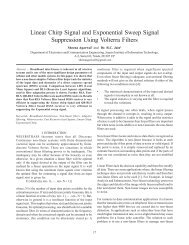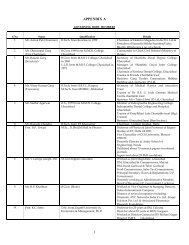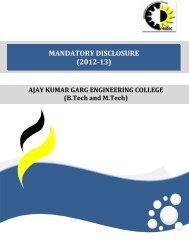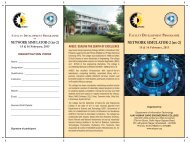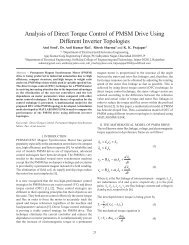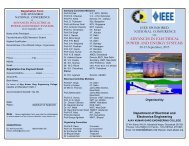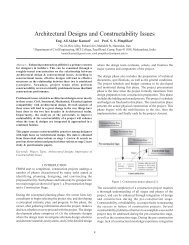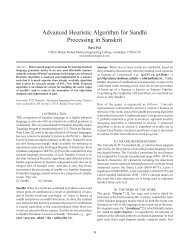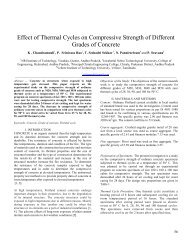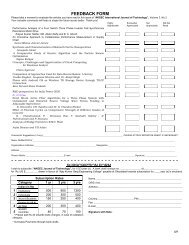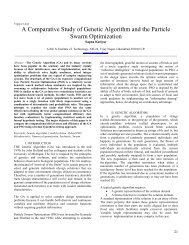Pdf Version - Ajay Kumar Garg Engineering College
Pdf Version - Ajay Kumar Garg Engineering College
Pdf Version - Ajay Kumar Garg Engineering College
You also want an ePaper? Increase the reach of your titles
YUMPU automatically turns print PDFs into web optimized ePapers that Google loves.
AKGEC<br />
<strong>Ajay</strong> <strong>Kumar</strong> <strong>Garg</strong> <strong>Engineering</strong> <strong>College</strong><br />
FACULTY DEVELOPMENT PROGRAMME<br />
on<br />
Functional Programming<br />
(April 12-13, 2012)<br />
5x-2=13<br />
then<br />
x=3<br />
But professor, you said<br />
yesterday that x was<br />
equal to 2!<br />
“The fun way to learn mathematical thinking”<br />
DEPARTMENT OF COMPUTER SCIENCE AND ENGINEERING<br />
AKGEC, Ghaziabad - 201009<br />
Phone: 0120-3291277/78/79, 6470765/66,3251275/76<br />
Fax: 0120-2767384<br />
Website: www.akgec.org
About the <strong>College</strong><br />
<strong>Ajay</strong> <strong>Kumar</strong> <strong>Garg</strong> <strong>Engineering</strong> <strong>College</strong>, Ghaziabad is affiliated to Mahamaya Technical University (MTU) and<br />
is approved by the All India Council for Technical Education. The <strong>College</strong> was<br />
established in 1998 and offers B.Tech. courses in six disciplines of<br />
<strong>Engineering</strong>. The college also offers postgraduate courses in Computer<br />
Application (MCA) and M.Tech. in Computer Science and <strong>Engineering</strong>,<br />
Automation & Robotics, Electronics and Communication <strong>Engineering</strong> and<br />
Electrical Power Energy Systems. The college strives for excellence and has<br />
the distinction of receiving Academic Excellence Award for Best <strong>Engineering</strong> <strong>College</strong> in UPTU consecutively<br />
for two years.<br />
The college has the distinction of being the only <strong>Engineering</strong> <strong>College</strong> in the state of Uttar Pradesh to have<br />
received approval from Deptt. of Science & Technology, Government of India, for establishment of Centre of<br />
Relevance and Excellence (CORE) in the field of Automation & Robotics under the mission REACH of TIFAC.<br />
The college has also established India's first industrial robotics training centre in collaboration with Kuka<br />
Robotics to train the students & technical manpower in advance robotics technologies.<br />
Why Functioanl Programming matters<br />
As software becomes more and more complex, it is more and more important to structure it well. Wellstructured<br />
software is easy to write, easy to debug, and provides a collection of modules that can be re-used to<br />
reduce future programming costs. Conventional languages place conceptual limits on the way problems can<br />
be modularized. Functional languages push those limits back.<br />
Functional programming is very different from imperative programming. The most significant differences<br />
stem from the fact that functional programming avoids side effects, which are used in imperative<br />
programming to implement state and I/O. Pure functional programming disallows side effects completely<br />
and so provides referential transparency, which makes it easier to verify, optimize, and parallelize programs,<br />
and easier to write automated tools to perform those tasks.<br />
To assist modular programming, a language must provide good glue. Functional programming languages<br />
provide two new kinds of glue - higher-order functions and lazy evaluation. Using these glues one can<br />
modularize programs in new and exciting ways.<br />
PROGRAMMING<br />
IMPERATIVE<br />
Functional programming has long been popular in academia, but with few industrial applications. However,<br />
recently several prominent functional programming languages have been used in commercial or industrial<br />
systems. For example, the Erlang programming language, which was developed by the Swedish company<br />
Ericsson in the late 1980s, was originally used to implement fault-tolerant telecommunications systems. It has<br />
since become popular for building a range of applications at companies such as T-Mobile, Nortel, Facebook<br />
and EDF. The Scheme dialect of Lisp was used as the basis for several applications on early Apple Macintosh<br />
computers, and has more recently been applied to problems such as training simulation software and<br />
telescope control. Objective Caml, which was introduced in the mid 1990s, has seen commercial use in areas<br />
such as financial analysis, driver verification, industrial robot programming, and static analysis of embedded<br />
software. Haskell, although initially intended as a research language, has also been applied by a range of<br />
companies, in areas such as aerospace systems, hardware design, and web programming. Other functional<br />
programming languages that have seen use in industry include Scala, F#, Lisp, Standard ML, and Clojure.<br />
DECLARATIVE<br />
PROCEDURAL<br />
E.G. FORTRAN,C<br />
OBJECT ORIENTED<br />
E.G. C++,JAVA<br />
LOGIC<br />
E.G. PROLOG<br />
FUNCTIONAL<br />
E.G. HASKELL, ERLANG<br />
This FDP is an attempt to demonstrate to the “ real world ” that functional programming is vitally important,<br />
and also to help functional programmers exploit its advantages to the full by making it clear what those<br />
advantages are.
Resource Person<br />
Prof. S. Arun <strong>Kumar</strong><br />
Department of Computer Science and <strong>Engineering</strong><br />
Indian Institute of Technology, Delhi<br />
Prof. S. Arun <strong>Kumar</strong> is Ph.D. in Computer Science, Tata Institute of Fundamental Research, University of Bombay. He<br />
completed MTech in Computer Science from Indian Institute of Technology, Bombay and B.Tech. in Mechanical<br />
<strong>Engineering</strong> from Indian Institute of Technology, Kanpur. His areas of interest include Programming Languages,<br />
Mobile Computation, Distributed Systems, Concurrency Theory, Logic, Program Verification, Formal Methods and<br />
Model-checking.<br />
Prof. <strong>Kumar</strong>'s extensive teaching and research experience has been with Indian Institute of Technology, Delhi, North<br />
Carolina State University, USA and University of Sussex, UK. He has a total experience of 23 years and is presently<br />
working with Indian Institute of Technology, Delhi since 1998. He has been associated with a number of research projects<br />
as Principal Investigator and Co-Investigator; the projects were funded by MHRD, Government of India; European<br />
Aeronautic Defence and Space Company, Netherlands; and Sun Microsystems, USA. He was also honored with Young<br />
Scientist Award from Department of Science and Technology, Govt. of India, for his contribution to the project<br />
“Efficiency Based Correctness Criteria for Concurrent Systems”. Prof. <strong>Kumar</strong> has also created web based courses on<br />
“Introduction to Computer Science” and a 40 hour video course on “Programming Languages”. He has a number of<br />
research papers published in reputed International journals to his credit.<br />
Program Details: (12-13 April 2012)<br />
th<br />
Day 1: 12 April 2012<br />
9:00 – 10:00 Registration & Tea<br />
10:00 – 10:30 Inaugural Session<br />
10:30 – 12:30 First Session- Introduction to Functional<br />
Programming, Overview of Standard ML<br />
12:30-13:30 Lunch Break<br />
13:30-14:30 Second Session- Some simple Standard<br />
ML programs<br />
14:30-14:45 Tea Break<br />
14:45-16:00 Third Session- Scope Rules and Recursion<br />
Registration<br />
Participants can register by sending the duly filled registration form along with registration fee of Rs. 1000/- in form of<br />
demand draft in favour of “<strong>Ajay</strong> <strong>Kumar</strong> <strong>Garg</strong> <strong>Engineering</strong> <strong>College</strong>”, payable at Ghaziabad to the following address latest<br />
by April 7, 2012 :<br />
The Co-ordinator<br />
Faculty Development Programme<br />
Department of Computer Science and <strong>Engineering</strong><br />
<strong>Ajay</strong> <strong>Kumar</strong> <strong>Garg</strong> <strong>Engineering</strong> <strong>College</strong><br />
27 km Stone, Delhi-Hapur Bypass Road, NH-24<br />
P.O. Adhyatmik Nagar<br />
Ghaziabad – 201009 (U.P.)<br />
PROGRAMMING<br />
The registration fee includes the FDP kit, course material and tea and lunch for the duration of the lectures. Candidates<br />
attending the full course will be awarded a certificate of participation at the end of the programme. Any queries may be<br />
forwarded to fpd_cse@akgec.org. Limited boarding and lodging facilities are available on the campus at nominal<br />
charges on first come first served basis.<br />
Organizing Committee<br />
IMPERATIVE<br />
DECLARATIVE<br />
Ÿ Prof. B.M. Kalra, Head of Department, CSE<br />
Ÿ Ms. Mamta Bhusry, Associate Professor, CSE<br />
Ÿ Mr. Akhilesh Verma, Assistant Professor, CSE, Contact : +919971897996<br />
th<br />
Day 2: 13 April 2012<br />
10:00-12:00 First Session- Higher-order functions ,<br />
Data types, constructors and pattern<br />
matching<br />
12:00-13:00 Lunch Break<br />
13:00-15:00 Second Session- Abstract Datatypes and<br />
PROCEDURAL<br />
E.G. FORTRAN,C<br />
Modularity, Signatures and Structures<br />
15:00-15:15 Tea Break<br />
15:15 -16:00 Concluding Session<br />
OBJECT ORIENTED<br />
E.G. C++,JAVA<br />
LOGIC<br />
E.G. PROLOG<br />
FUNCTIONAL<br />
E.G. HASKELL, ERLANG
AJAY KUMAR GARG ENGINEERING COLLEGE<br />
AKGEC<br />
FACULTY DEVELOPMENT PROGRAMME<br />
ON<br />
FUNCTIONAL PROGRAMMING<br />
(April 12-13, 2012)<br />
REGISTRATION FORM<br />
Name of Participant : ..........................................................................................................<br />
Educational Qualification : ..........................................................................................................<br />
Designation : ..........................................................................................................<br />
Name and Address of Affiliated <strong>College</strong> : ..........................................................................................................<br />
..........................................................................................................<br />
..........................................................................................................<br />
E-mail : ..........................................................................................................<br />
Contact # : ..........................................................................................................<br />
Signature of Participant<br />
PROGRAMMING<br />
Details of Registration Fee Payment :<br />
IMPERATIVE<br />
: …………………………….............………………………………<br />
DECLARATIVE<br />
PROCEDURAL<br />
E.G. FORTRAN,C<br />
OBJECT ORIENTED<br />
E.G. C++,JAVA<br />
LOGIC<br />
E.G. PROLOG<br />
FUNCTIONAL<br />
E.G. HASKELL, ERLANG<br />
Draft No. : …………………………...................……………..Dated :…………….....................…………………<br />
Bank Name :………………………………….............................................………………………………………..<br />
Draft to be in the name of “<strong>Ajay</strong> <strong>Kumar</strong> <strong>Garg</strong> <strong>Engineering</strong> <strong>College</strong>”, payable at Ghaziabad<br />
Accommodation required<br />
: Yes / No<br />
Please mail the duly completed registration form along with draft to :<br />
The Co-ordinator<br />
Faculty Development Programme<br />
Department of Computer Science and <strong>Engineering</strong><br />
<strong>Ajay</strong> <strong>Kumar</strong> <strong>Garg</strong> <strong>Engineering</strong> <strong>College</strong><br />
27 km Stone, Delhi-Hapur Bypass Road, NH-24<br />
P.O. Adhyatmik Nagar<br />
Ghaziabad – 201009 (U.P.)<br />
* Last date of registration is April 7, 2012


